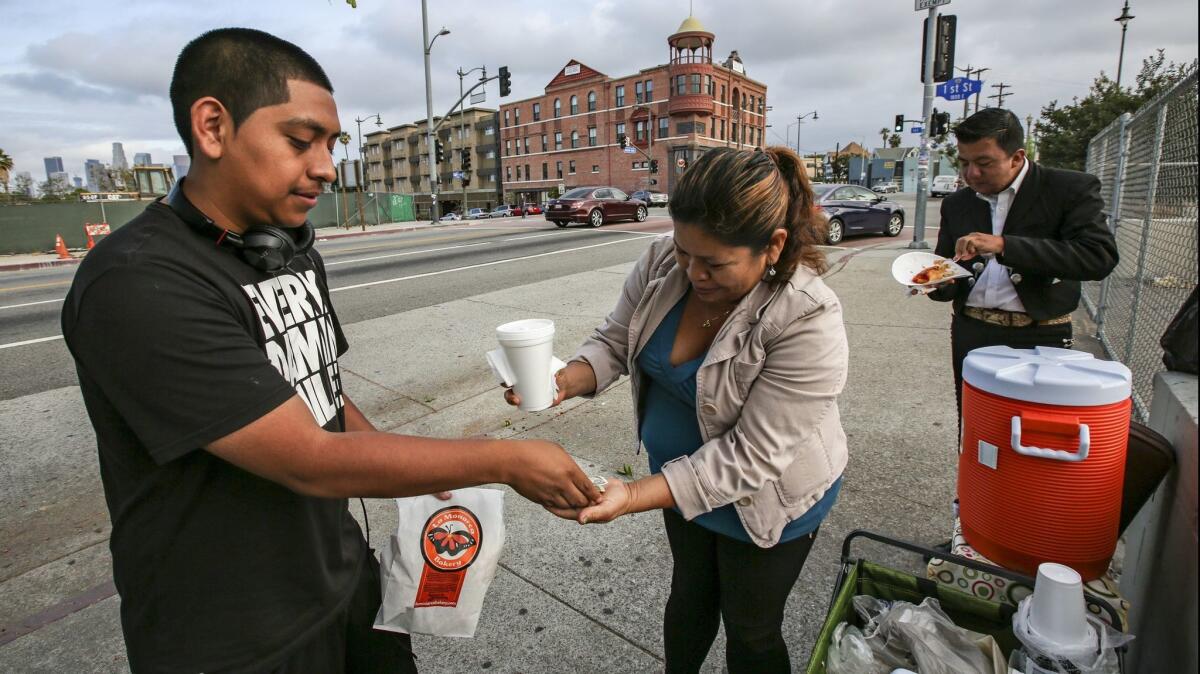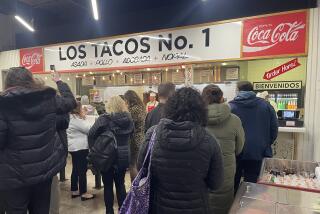Op-Ed: California legalized the sale of homemade food. It should remove barriers for other industries too

As autumn begins and Thanksgiving approaches, I’m already looking forward to tamale season, the Mexican American holiday tradition that for many begins in home kitchens filled with corn husks, masa and fillings, and which those of us who are less skilled in the culinary arts celebrate with a delicious purchase.
Marking these transactions last year, Gustavo Arellano explained: “In the parking lots of Latino grocery stores across Southern California, the call of ‘Tamales! Tamales!’ from women selling out of their car trunks is as ubiquitous as the clash of shopping carts.”
State law will soon be less burdensome for those women. Last month, Gov. Jerry Brown signed Assembly Bill 626, decriminalizing the sale of homemade food. When the law goes into effect on Jan. 1, life will improve for tamale vendors and countless other small-scale cooks who sell what they prepare at home — whether they are immigrants spreading the street food of their native countries, underemployed millennials brewing up batches of kombucha or stay-at-home parents baking tasty birthday cakes.
Assemblyman Eduardo Garcia, the Coachella Democrat who sponsored the legislation, says that his constituents were long frustrated that the selling of food from home kitchens was treated as a criminal act, and that he aims with the reformed approach “to knock down barriers and expand opportunities for marginalized populations who often lack access to the professional food world.”
Now that Brown has helped ease the burdens on home cooks, a bipartisan push to ease difficulties for other enterprising workers could finally be in reach.
Restrictions, some overly onerous, will remain. The new law doesn’t permit the sale of raw meat or oysters, limits annual earnings to $50,000, allows no more than one employee, and requires a home-cooking license and kitchen inspection at an estimated cost of around $500. What’s more, individual counties can choose not to participate in the reformed system.
Still, it is a significant step in the right direction, reflecting bipartisan recognition of the ways that overzealous food regulation disproportionately hurts those at the very bottom of the state’s economic ladder, robbing them of opportunities to better their lot, undermining their self-reliance, and leaving them vulnerable to needless legal sanctions.
These same insights should be applied to restrictions on the right to earn a living in other industries. Occupational licensing in California dates to 1850, when a law forced foreigners to buy a permit to mine gold, Stanford University lecturer David Crane recounted last year. By 1950, one in 20 workers in the state required a license. Today, one in five working Californians needs one.
Some of those Californians are doctors or dentists or lawyers whose high salaries are arguably owed in part to the ways that their professional cartels limit new entrants into their fields. But the system is tougher on those at the bottom.
When the Institute for Justice, a public interest law firm, studied occupational licensing laws in all 50 states, it found not only that California was “the most broadly and onerously licensed state in the nation,” but that it is “the worst licensing environment for workers in lower-income occupations,” imposing various barriers to entry in roughly three-fourths of the working class jobs that were studied.
An aspiring tree-trimmer in California must prove 1,460 days of on-the-job experience. Becoming a manicurist requires 93 days of education. Even travel guides must pay a $216 fee to state coffers in order to ply their trade.
Enter the Fray: First takes on the news of the minute from L.A. Times Opinion »
“To improve its rankings and expand opportunity, California should repeal or reduce its many needless and irrational burdens, or — if government regulation is necessary –– replace them with less restrictive regulatory alternatives,” the study’s authors recommended.
Gov. Jerry Brown could be a partial ally in that effort. When legislators sent a bill to his desk that would have regulated who can use the title “Board Certified Music Therapist,” he declined to sign it.
“I have been very reluctant to add licensing or title statutes,” Brown explained in his official veto message. “This bill appears to be unnecessary as the Certification Board for Music Therapists, a private sector group, already has defined standards for board certification. Why have the state now add another violin to the orchestra?”
Now that Brown has helped ease the burdens on home cooks — legislation that held natural appeal to the state’s remaining Republicans — a bipartisan push to ease difficulties for other enterprising workers could finally be in reach.
Conor Friedersdorf is a contributing writer to Opinion, a staff writer at the Atlantic and founding editor of the Best of Journalism, a newsletter that curates exceptional nonfiction.
Follow the Opinion section on Twitter @latimesopinion or Facebook
More to Read
A cure for the common opinion
Get thought-provoking perspectives with our weekly newsletter.
You may occasionally receive promotional content from the Los Angeles Times.






